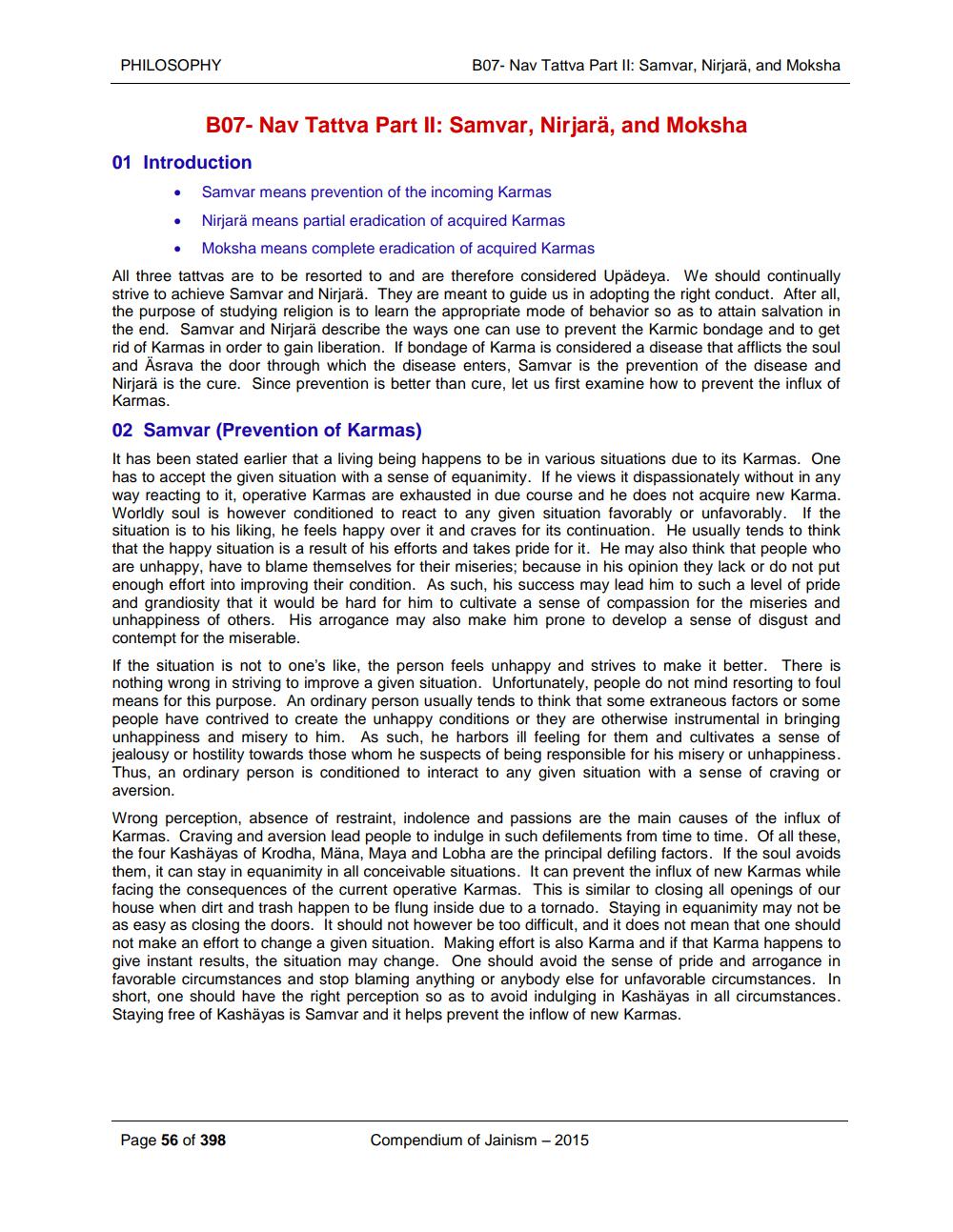________________
PHILOSOPHY
B07- Nav Tattva Part II: Samvar, Nirjarä, and Moksha
B07- Nav Tattva Part II: Samvar, Nirjarä, and Moksha
01 Introduction
• Samvar means prevention of the incoming Karmas • Nirjarä means partial eradication of acquired Karmas
Moksha means complete eradication of acquired Karmas All three tattvas are to be resorted to and are therefore considered Upädeya. We should continually strive to achieve Samvar and Nirjarä. They are meant to guide us in adopting the right conduct. After all, the purpose of studying religion is to learn the appropriate mode of behavior so as to attain salvation in the end. Samvar and Nirjarä describe the ways one can use to prevent the Karmic bondage and to get rid of Karmas in order to gain liberation. If bondage of Karma is considered a disease that afflicts the soul and Asrava the door through which the disease enters, Samvar is the prevention of the disease and Nirjarä is the cure. Since prevention is better than cure, let us first examine how to prevent the influx of Karmas. 02 Samvar (Prevention of Karmas) It has been stated earlier that a living being happens to be in various situations due to its Karmas. One has to accept the given situation with a sense of equanimity. If he views it dispassionately without in any way reacting to it, operative Karmas are exhausted in due course and he does not acquire new karma. Worldly soul is however conditioned to react to any given situation favorably or unfavorably. If the situation is to his liking, he feels happy over it and craves for its continuation. He usually tends to think that the happy situation is a result of his efforts and takes pride for it. He may also think that people who are unhappy, have to blame themselves for their miseries; because in his opinion they lack or do not put enough effort into improving their condition. As such, his success may lead him to such a level of pride and grandiosity that it would be hard for him to cultivate a sense of compassion for the miseries and unhappiness of others. His arrogance may also make him prone to develop a sense of disgust and contempt for the miserable.
If the situation is not to one's like, the person feels unhappy and strives to make it better. There is nothing wrong in striving to improve a given situation. Unfortunately, people do not mind resorting to foul means for this purpose. An ordinary person usually tends to think that some extraneous factors or some people have contrived to create the unhappy conditions or they are otherwise instrumental in bringing unhappiness and misery to him. As such, he harbors ill feeling for them and cultivates a sense of jealousy or hostility towards those whom he suspects of being responsible for his misery or unhappiness. Thus, an ordinary person is conditioned to interact to any given situation with a sense of craving or aversion. Wrong perception, absence of restraint, indolence and passions are the main causes of the influx of Karmas. Craving and aversion lead people to indulge in such defilements from time to time. Of all these, the four Kashayas of Krodha, Mäna, Maya and Lobha are the principal defiling factors. If the soul avoids them, it can stay in equanimity in all conceivable situations. It can prevent the influx of new karmas while facing the consequences of the current operative Karmas. This is similar to closing all openings of our house when dirt and trash happen to be flung inside due to a tornado. Staying in equanimity may not be as easy as closing the doors. It should not however be too difficult, and it does not mean that one should not make an effort to change a given situation. Making effort is also Karma and if that Karma happens to give instant results, the situation may change. One should avoid the sense of pride and arrogance in favorable circumstances and stop blaming anything or anybody else for unfavorable circumstances. In short, one should have the right perception so as to avoid indulging in Kashayas in all circumstances. Staying free of Kashayas is Samvar and it helps prevent the inflow of new Karmas.
Page 56 of 398
Compendium of Jainism - 2015




